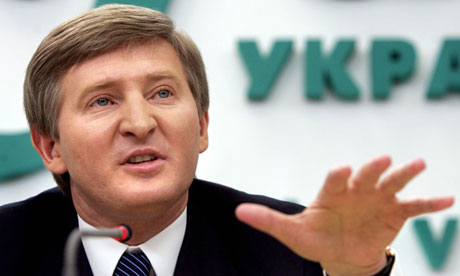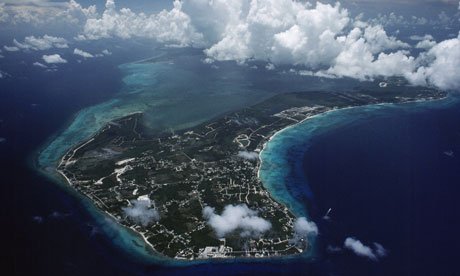Exclusive: Offshore financial industry leak exposes identities of 1,000s of holders of anonymous wealth from around the world
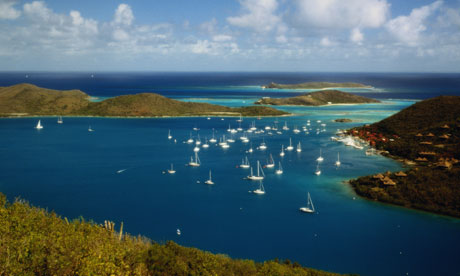
The British Virgin Islands, the world's leading offshore haven used by an array of government officials and rich families to hide their wealth. Photograph: Duncan Mcnicol/Getty Images
Millions of internal records have leaked from Britain's offshore financial industry, exposing for the first time the identities of thousands of holders of anonymous wealth from around the world, from presidents to plutocrats, the daughter of a notorious dictator and a British millionaire accused of concealing assets from his ex-wife.
The leak of 2m emails and other documents, mainly from the offshore haven of the British Virgin Islands (BVI), has the potential to cause a seismic shock worldwide to the booming offshore trade, with a former chief economist at McKinsey estimating that wealthy individuals may have as much as $32tn (£21tn) stashed in overseas havens.
In France, Jean-Jacques Augier, President François Hollande's campaign co-treasurer and close friend, has been forced to publicly identify his Chinese business partner. It emerges as Hollande is mired in financial scandal because his former budget minister concealed a Swiss bank account for 20 years and repeatedly lied about it.
In Mongolia, the country's former finance minister and deputy speaker of its parliament says he may have to resign from politics as a result of this investigation.
But the two can now be named for the first time because of their use of companies in offshore havens, particularly in the British Virgin Islands, where owners' identities normally remain secret.
The names have been unearthed in a novel project by the Washington-based International Consortium of Investigative Journalists [ICIJ], in collaboration with the Guardian and other international media, who are jointly publishing their research results this week.
The naming project may be extremely damaging for confidence among the world's wealthiest people, no longer certain that the size of their fortunes remains hidden from governments and from their neighbours.
BVI's clients include Scot Young, a millionaire associate of deceased oligarch Boris Berezovsky. Dundee-born Young is in jail for contempt of court for concealing assets from his ex-wife.
Young's lawyer, to whom he signed over power of attorney, appears to control interests in a BVI company that owns a potentially lucrative Moscow development with a value estimated at $100m.
Another is jailed fraudster Achilleas Kallakis. He used fake BVI companies to obtain a record-breaking £750m in property loans from reckless British and Irish banks.
As well as Britons hiding wealth offshore, an extraordinary array of government officials and rich families across the world are identified, from Canada, the US, India, Pakistan, Indonesia, Iran, China, Thailand and former communist states.
The data seen by the Guardian shows that their secret companies are based mainly in the British Virgin Islands.
Sample offshore owners named in the leaked files include:
• Jean-Jacques Augier, François Hollande's 2012 election campaign co-treasurer, launched a Caymans-based distributor in China with a 25% partner in a BVI company. Augier says his partner was Xi Shu, a Chinese businessman.
• Mongolia's former finance minister. Bayartsogt Sangajav set up "Legend Plus Capital Ltd" with a Swiss bank account, while he served as finance minister of the impoverished state from 2008 to 2012. He says it was "a mistake" not to declare it, and says "I probably should consider resigning from my position".
• The president of Azerbaijan and his family. A local construction magnate, Hassan Gozal, controls entities set up in the names of President Ilham Aliyev's two daughters.
• The wife of Russia's deputy prime minister. Olga Shuvalova's husband, businessman and politician Igor Shuvalov, has denied allegations of wrongdoing about her offshore interests.
•A senator's husband in Canada. Lawyer Tony Merchant deposited more than US$800,000 into an offshore trust.
He paid fees in cash and ordered written communication to be "kept to a minimum".
• A dictator's child in the Philippines: Maria Imelda Marcos Manotoc, a provincial governor, is the eldest daughter of former President Ferdinand Marcos, notorious for corruption.
• Spain's wealthiest art collector, Baroness Carmen Thyssen-Bornemisza, a former beauty queen and widow of a Thyssen steel billionaire, who uses offshore entities to buy pictures.
• US: Offshore clients include Denise Rich, ex-wife of notorious oil trader Marc Rich, who was controversially pardoned by President Clinton on tax evasion charges. She put $144m into the Dry Trust, set up in the Cook Islands.
It is estimated that more than $20tn acquired by wealthy individuals could lie in offshore accounts. The UK-controlled BVI has been the most successful among the mushrooming secrecy havens that cater for them.
The Caribbean micro-state has incorporated more than a million such offshore entitiessince it began marketing itself worldwide in the 1980s. Owners' true identities are never revealed.
Even the island's official financial regulators normally have no idea who is behind them.
The British Foreign Office depends on the BVI's company licensing revenue to subsidise this residual outpost of empire, while lawyers and accountants in the City of London benefit from a lucrative trade as intermediaries.
They claim the tax-free offshore companies provide legitimate privacy. Neil Smith, the financial secretary of the autonomous local administration in the BVI's capital Tortola, told the Guardian it was very inaccurate to claim the island "harbours the ethically challenged".
He said: "Our legislation provides a more hostile environment for illegality than most jurisdictions".
Smith added that in "rare instances …where the BVI was implicated in illegal activity by association or otherwise, we responded swiftly and decisively".
The Guardian and ICIJ's Offshore Secrets series last year exposed how UK property empires have been built up by, among others, Russian oligarchs, fraudsters and tax avoiders, using BVI companies behind a screen of sham directors.
Such so-called "nominees", Britons giving far-flung addresses on Nevis in the Caribbean, Dubai or the Seychelles, are simply renting out their names for the real owners to hide behind.
The whistleblowing group WikiLeaks caused a storm of controversy in 2010 when it was able to download almost two gigabytes of leaked US military and diplomatic files.
The new BVI data, by contrast, contains more than 200 gigabytes, covering more than a decade of financial information about the global transactions of BVI private incorporation agencies. It also includes data on their offshoots in Singapore, Hong Kong and the Cook Islands in the Pacific.
-----
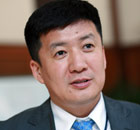
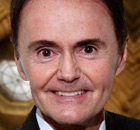
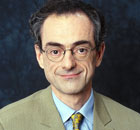
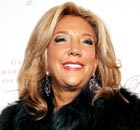
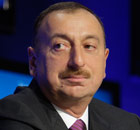
Name: Baroness Carmen Thyssen-Bornemisza
Offshore Companies: Sargasso Trustees Ltd (1996-2004) and Nautilus Ltd (1994), both registered in the Cook Is. Her son, Borja, also has some of the shares
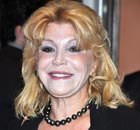
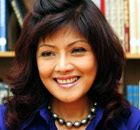
-----
Profiles of leading secret account holders
Leading figures across the globe with secret overseas entities
Mongolia
Name: Bayartsogt Sangajav
Offshore company: Legend Plus Capital Limited
Offshore company: Legend Plus Capital Limited

One of Mongolia's most senior politicians says he is considering resigning from office after being confronted with evidence of his offshore entity and secret Swiss bank account.
"I shouldn't have opened that account. I should have included the company in my declarations," Bayartsogt Sangajav told the International Consortium of Investigative Journalists (ICIJ). "I don't worry about my reputation. I worry about my family. I probably should consider resigning from my position."
Bayartsogt, who says his account at one point contained more than $1 million, became his country's finance minister in September 2008, a position he held until a cabinet reshuffle in August 2012. He is now the deputy speaker of Parliament.
During those years he attended international meetings and served as governor of the Asian Development Bank and the European Bank of Reconstruction, pushing the case for his poor nation to receive foreign development assistance and investment.
Canada
Name: Tony Merchant
Offshore Company: Merchant (2000) US Inc Trust
Offshore Company: Merchant (2000) US Inc Trust

Colourful lawyer and former politician, married to Liberal party senator Pana Merchant. Known for challenges to the Canadian revenue agency over his tax payments . He has also been disciplined by the Law Society for "conduct unbecoming ." In 1998, launched Cook Islands trust with deposit of more than US$800,000 as settlor and initially as beneficiary. Sent fee payments in cash envelopes: the agents noted "All communications regarding this trust is to be kept to a minimum…Do not ever send faxes cos he will have a stroke about it"
Comment: Declines to comment
France
Name: Jean-Jacques Augier
Offshore company: International Bookstores Ltd [IBL]
Offshore company: International Bookstores Ltd [IBL]

Publisher and Sinologist. Campaign treasurer of François Hollande for the 2012 presidential elections. They studied together at the prestigious National School of Management (ENA). Chief Executive of Eurane SA. Made large publishing investment in China 2005. Caymans-registered entity IBL, set up with 25% shareholding granted to BVI company Sinolinks Transworld Investment Consultancy, and 2.5% shareholding to a Hong Kong entity Capital Concord Developments Ltd.
Comment: He says partner in the offshore firm was Xi Shu, a businessman and a member of the Chinese People's Political Consultative Conference, a political advisory body.
Russia
Name: Olga Shuvalova
Offshore companies: Plato Management & other BVI companies owned by Severin Enterprises Inc
Offshore companies: Plato Management & other BVI companies owned by Severin Enterprises Inc
Wife of Igor Shuvalov, a businessman and politician close to Putin , first deputy prime minister since 2008. In 2007, she is recorded as owning Severin Enterprises , set up via Moscow agency Amond & Smith. The dealings of another of its subsidiaries, Bahamas-registered Sevenkey Ltd, were detailed in a 2011 investigative article in Barron's, which tied the company to her husband, who has denied wrongdoing.
Comment: declines to comment
US
Name: Denise Rich
Offshore company: The Dry Trust
Offshore company: The Dry Trust

Among nearly 4,000 American names is Denise Rich, a songwriter whose ex-husband, the oil trader Marc Rich, was pardoned by President Clinton as he left office in 2001, over tax evasion and racketeering charges. A Congressional investigation found that Rich, who raised millions of dollars for Democratic politicians, helped promote the pardon. She had $144 million in April 2006 in the trust in the Cook Islands plus a yacht called the Lady Joy, where Rich often entertained celebrities and raised money for charity.
Comment: Rich, who gave up her U.S. citizenship in 2011 and now maintains citizenship in Austria, did not reply to questions about her offshore trust
Azerbaijan
Name: President Ilham Aliyev and family
Offshore Companies: Arbor Investments; LaBelleza Holdings; Harvard Management; Rosamund International
Offshore Companies: Arbor Investments; LaBelleza Holdings; Harvard Management; Rosamund International

Three BVI entities set up in 2008 in the names of the president's daughters, Arzu and Leyla,. They list as a director wealthy local businessman, Hassan Gozal. His construction company has won major contracts in Azerbaijan. Another BVI entity set up in 2003, lists the president and his wife Mehriban as owners.
Comment: Those involved decline to comment
Spain
Name: Baroness Carmen Thyssen-Bornemisza
Offshore Companies: Sargasso Trustees Ltd (1996-2004) and Nautilus Ltd (1994), both registered in the Cook Is. Her son, Borja, also has some of the shares

Former beauty queen, Spanish-based art collector and widow of a billionaire Thyssen steel heir, she used the offshore vehicles to buy art, including Van Gogh's "Watermill at Gennep" from Sotheby and Christies in London.
Her lawyer acknowledged that she gains tax benefits by holding ownership of her art offshore, but stressed that she primarily seeks "maximum flexibility" to move art from country to country
Comment: Her lawyer acknowledged tax benefits from owning art offshore, but stressed that she primarily seeks "maximum flexibility" to move art from country to country
Philippines
Name: Maria Imelda Marcos Manotoc
Offshore company: Sintra Trust [BVI]
Offshore company: Sintra Trust [BVI]

Late president Marcos' eldest daughter, now a provincial governor, is listed in 2005 in the BVI as the "investment advisor" and beneficiary of the Sintra Trust, set up by her associate, businessman Mark Chua of Singapore. She does not mention the trust in her Philippines declarations of financial interests
Comment: She declined to answer a series of questions from local journalists about the trust
• It is not suggested that any of those listed here have behaved unlawfully. Offshore entities can be held legitimately: the only aspect those listed below have in common is that they have used a jurisdiction which provides them with secrecy. This list is compiled from ICIJ data in the interests of accountability and transparency: any inaccuracies will be corrected promptly if brought to our attention.
Related Articles:
1. £13tn: hoard hidden from taxman by global elite
Related Articles:
1. £13tn: hoard hidden from taxman by global elite
